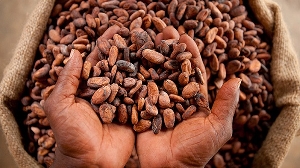


 Ghana expects to harvest 650,000 tons of cocoa this season
Ghana expects to harvest 650,000 tons of cocoa this season
Ghana’s cocoa regulator’s growing dependence on top exporters to help finance bean purchases is leaving local buying companies marginalized and making the world’s No. 2 grower and global markets increasingly reliant on big foreign players.
Top exporters stepped in to fill the gap after efforts by industry regulator, the Ghana Cocoa Board, known as COCOBOD, to secure a $1.5 billion loan to finance the current season stalled earlier this year, according to people with knowledge of the matter who asked not to be named because of the private nature of the information.
While traders helped the board finance operations last season too, this time around the mechanics are trickier.
The traders, including Cargill Inc., Olam Group Ltd., and Barry Callebaut AG, are advancing loans to local licensed buying companies — some of which are their own units — authorized to purchase beans from farmers.
For more than three decades, Ghana had relied on an annual loan from international banks for Cocobod to pre-finance bean purchases at the farm level and provide growers with inputs like seedlings, chemicals, and fertilizer.
The regulator has said it wants to wean itself off dependence on loans and the new model helps both farmers and buyers. But industry players and analysts say the move risks eroding oversight in a market that has been tightly government-controlled for decades. It also comes after a series of poor crops, alongside weak output in Ivory Coast, that racked up trader losses and helped propel cocoa futures to record levels in New York this year.
Local buying companies, the traditional intermediaries between the farmers and the regulators, are now on the sidelines, with only a handful of LBCs working with foreign exporters currently making purchases, according to Victus Dzah, executive secretary of the Licensed Cocoa Buyers Association of Ghana.
The new model means the regulator won’t have adequate funds to cover costs like free pesticides and subsidized fertilizers for growers until commitments to buyers have been met, according to one person familiar with the mechanism.
The system will work for now because the supplies are tight and prices are high, the person said, adding that when production picks up and demand eases, there’s a risk that farmers will be stuck with beans and the board will have no money to step in.
A spokesperson for Ghana’s cocoa regulator did not return phone calls and text messages seeking comment.
“Through Cocobod’s new financial model, Cargill is supporting cocoa farming communities and many local LBCs in Ghana, by injecting liquidity to help accelerate the purchase of cocoa beans,” a spokesperson for Cargill said. Barry Callebaut declined to comment. A spokesperson for Olam didn’t respond to an email seeking a response.
The nation expects to harvest 650,000 tons of cocoa this season, 20% below earlier forecasts. Still, about 250,000 tons will be used to fulfill contracts from the previous season.
Cocobod’s position as “an anchor and a built-in stabilizer” to protect farmers is under threat as it cedes control to big buyers, said Godfred Bokpin, an economist at the University of Ghana Business School.
Apart from struggling to raise funds at high interest rates, local buyers are also hemmed in by the slow pace at which the Cocobod repays them, according to Dzah, who helms the local buyers’ group.
Of the 62 registered companies listed with the group, only 20 are active in the market now, with five firms owned by foreign export houses controlling over 60% of the business, he added.
Watch the latest edition of BizTech below:
Click here to follow the GhanaWeb Business WhatsApp channel